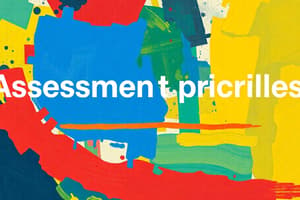Podcast
Questions and Answers
What was the initial reaction of Dr. Davis to the request from the lawyer?
What was the initial reaction of Dr. Davis to the request from the lawyer?
- She was enthusiastic about the opportunity.
- She felt uncomfortable about the situation. (correct)
- She believed her data was sufficient for the case.
- She readily agreed to provide her testimony.
What was Dr. Davis unable to do regarding the legal question?
What was Dr. Davis unable to do regarding the legal question?
- Seek advice from other professionals.
- Reassess her client's therapy needs.
- Collect more data from her client.
- Address the legal question concerning her client's condition. (correct)
What did the lawyer inform Dr. Davis about her testimony?
What did the lawyer inform Dr. Davis about her testimony?
- It was unnecessary for the case.
- It was vital for the success of their client's case. (correct)
- It would be easily dismissed in court.
- It should be kept confidential from others.
What does the passage imply about the relationship between psychologists and lawyers in stressful situations?
What does the passage imply about the relationship between psychologists and lawyers in stressful situations?
According to the passage, how common are situations like the one described?
According to the passage, how common are situations like the one described?
What governs the access to relevant information in a forensic setting?
What governs the access to relevant information in a forensic setting?
Why is it important to understand conflicts of interest in forensic evaluations?
Why is it important to understand conflicts of interest in forensic evaluations?
What is a crucial procedure when performing a forensic evaluation?
What is a crucial procedure when performing a forensic evaluation?
What principle is highlighted regarding combining therapeutic and forensic roles?
What principle is highlighted regarding combining therapeutic and forensic roles?
What aspect of forensic evaluations is particularly emphasized by Greenberg and Shuman?
What aspect of forensic evaluations is particularly emphasized by Greenberg and Shuman?
Which of the following is NOT a focus in forensic evaluations?
Which of the following is NOT a focus in forensic evaluations?
According to the principles discussed, which scenario is likely to create ethical issues?
According to the principles discussed, which scenario is likely to create ethical issues?
What is the role of authorization in forensic evaluations?
What is the role of authorization in forensic evaluations?
What are some factors contributing to the popularity of forensic work among mental health practitioners?
What are some factors contributing to the popularity of forensic work among mental health practitioners?
Which concept must clinicians understand to navigate a forensic role effectively?
Which concept must clinicians understand to navigate a forensic role effectively?
In what scenario can a clinician reveal confidential information?
In what scenario can a clinician reveal confidential information?
What crucial difference can the allure of financial gain blind clinicians to?
What crucial difference can the allure of financial gain blind clinicians to?
Which of the following is NOT classified as part of the related work product in a clinical setting?
Which of the following is NOT classified as part of the related work product in a clinical setting?
When can a client legally obtain their confidential data?
When can a client legally obtain their confidential data?
What may lead to a mental health practitioner engaging in forensic work?
What may lead to a mental health practitioner engaging in forensic work?
Why is it important for clinicians to differentiate between their roles?
Why is it important for clinicians to differentiate between their roles?
What is one key difference in the relationship dynamics during psychological evaluations?
What is one key difference in the relationship dynamics during psychological evaluations?
In what scenario might the psychologist's goals shift from client advocacy to data advocacy?
In what scenario might the psychologist's goals shift from client advocacy to data advocacy?
What impacts the scrutiny of data gathered during an evaluation?
What impacts the scrutiny of data gathered during an evaluation?
How does jurisdiction affect the evaluation process?
How does jurisdiction affect the evaluation process?
What might impact a defendant's level of cooperation during a competency evaluation?
What might impact a defendant's level of cooperation during a competency evaluation?
Which of the following competencies might differ between psychologists conducting evaluations?
Which of the following competencies might differ between psychologists conducting evaluations?
What potential issue arises from the evaluator's dual role of supporting the client and advocating for data?
What potential issue arises from the evaluator's dual role of supporting the client and advocating for data?
Which of these statements is false regarding the informed consent process in evaluations?
Which of these statements is false regarding the informed consent process in evaluations?
Which factor is NOT considered regarding the admissibility of expert testimony?
Which factor is NOT considered regarding the admissibility of expert testimony?
What is the primary basis for a clinician to testify about a client's symptoms?
What is the primary basis for a clinician to testify about a client's symptoms?
Which of the following is NOT one of the five factors for expert testimony admissibility?
Which of the following is NOT one of the five factors for expert testimony admissibility?
How does the Daubert decision impact expert testimony?
How does the Daubert decision impact expert testimony?
Which statement accurately describes the clinician's role regarding client testimony?
Which statement accurately describes the clinician's role regarding client testimony?
What aspect of a technique is assessed through peer review?
What aspect of a technique is assessed through peer review?
Why is the error rate significant for expert testimony?
Why is the error rate significant for expert testimony?
Which quality is essential for a technique to gain acceptance in a scientific community?
Which quality is essential for a technique to gain acceptance in a scientific community?
Flashcards are hidden until you start studying
Study Notes
Evaluation Differences
- Definition of the client varies between roles; forensic evaluations may focus on legal standards, while clinical evaluations prioritize therapeutic relationships.
- The evaluator's relationship with the evaluee can be adversarial or objective, contrasting with therapeutic and supportive dynamics in clinical settings.
- Psychologist goals differ: in clinical settings, the aim is to advocate for the client's well-being, while in forensic evaluations, the focus is on data accuracy and objectivity.
Data Scrutiny
- Data gathering methods vary; clinicians may trust client information, whereas forensic evaluators often seek collateral data to confirm details.
- There are differing scrutiny regulations across jurisdictions regarding competency evaluations and privacy laws impacting defendant cooperation during interviews.
Informed Consent and Confidentiality
- Informed consent processes differ significantly between forensic and clinical evaluations, affecting confidentiality and privilege surrounding sensitive information.
- The handling of client data varies; in clinical roles, clients hold the right to waive confidentiality, while forensic evaluations are governed by the retaining party's rules.
Dual Roles and Ethical Concerns
- Combining therapeutic and forensic roles can result in conflicts of interest; ethical guidelines discourage dual engagement.
- Significant principles exist detailing the complications of merging clinical and forensic practices; understanding these is crucial for ethical practice.
Expert Testimony Admissibility
- Five factors influence the admissibility of expert testimony:
- Testing of the relevant theory or technique
- Peer review and publication status
- Known error rate
- Maintenance of operational standards
- Acceptance within relevant scientific communities
- The Daubert decision established that judges assess the reliability of scientific evidence provided in court.
Ethical Challenges in Legal Contexts
- Clinicians may feel pressured to assist legal professionals despite ethical dilemmas, resulting in potential conflicts between client welfare and legal requirements.
- Clinicians must maintain professional integrity and avoid compromising their ethical responsibilities for external pressures.
Case Example
- Ms. Jones sought therapy, underscoring the dynamic and sensitive nature of client evaluations in clinical settings compared to those conducted for forensic purposes.
Studying That Suits You
Use AI to generate personalized quizzes and flashcards to suit your learning preferences.




